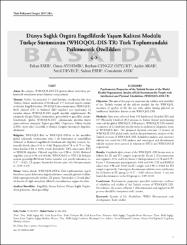Psychometric properties of the Turkish version of the world health organization quality of life ınstrument for people with ıntellectual and physical disabilities (WHOQOL-DIS-TR)

View/
Access
info:eu-repo/semantics/openAccessDate
2018Author
Eser, ErhanAydemir, Ömer
Özyurt, Beyhan Cengiz
Akar, Aydın
Deveci, Özlem Serol
Eser, Sultan
Ayık, Cemalettin
Metadata
Show full item recordAbstract
Objective: The aim of this paper is to present the validity and reliability of the Turkish version of the add-on module for the WHOQOL measures of quality of life for use with adults having physical or intellectual disabilities known as the WHOQOL-DIS.
Methods: Data were collected from 150 Intellectual Disabled (ID) and 157 Physically Disabled (PD) persons in Turkey (Izmir) participating center of the global WHOQOL-DIS project. WHOQOL-DIS module is consisted of 12 disability specific items in addition to 26 generic items of WHOQOL-Bref. The proposed factorial structure (3 factors) of WHOQOL-DIS global study used in the psychometric analyses of the Turkish versions of WHOQOL-DIS. Reliability analyses and construct validity was tested via CFA analyses and convergent and discriminant validity analyses were assessed in relation to SWLS and WHODAS-II respectively.
Results: Cronbach alpha values of the WHOQOL-DIS factors were as follows for ID and PD samples respectively: Factor 1 (Discrimination and support)= 0.54 and 0.64; Factor 2 (Independence)= 0.78 and 0.79; Factor 3 (Community participation)= 0.88 and 0.83. CFI and RMSEA values were 0.98 and 0.065 for ID sample and 0.98 ve 0.064 for PD sample respectively. Convergent-discriminant validities were satisfactory for all factors in PD group (r= 0.27 -0.62) whereas Factor 1 was not found discriminative in the ID group (r= 0.09 -0.10).
Conclusion: Psychometric properties provided satisfactory evidence of reliability and validity of the Turkish version of WHOQOL-DIS. Nevertheless the results of Factor 1 (Discrimination and support) in ID persons should be interpreted with caution. Amaç: Bu çalışma, WHOQOL-DIS-TR projesi ulusal verilerinin psikometrik sonuçlarını ortaya koymayı amaçlamıştır.
Yöntem: Veriler, bu projedeki 15 aktif katılımcı merkezden biri olan Türkiye (İzmir) merkezinde (150 zihinsel, 157 bedensel engelli erişkin) verileridir. Engelli bireylere, WHOQOL kısa sürümünün (WHOQOLBref) zihinsel (ZE) ve bedensel (BE) engelliler için uyarlanmış 12 sorudan oluşan WHOQOL-DIS engelli modülü uygulanmıştır. Bu çalışmada ölçeğin Türkçe sürümünün, güvenilirlik ve geçerlilik çözümlemelerinde “global WHOQOL-DIS” çalışmasında önerilen boyut yapısı referans alınmıştır. Yapısal geçerlilik, Doğrulayıcı Faktör Analizi (DFA), Ayırt edici Geçerlilik ve Bilinen Gruplar yöntemiyle değerlendirilmiştir.
Bulgular: WHOQOL-Bref ve WHOQOL-DIS’in ve bu modülün global çalışmada tanımlanmış olan 3 alt boyutunun iç tutarlılıkları
(Zihinsel ve Bedensel engellilerde Cronbach alfa değerleri sırasıyla: Ayrımcılık-destek alma=0.54 ve 0.64; Bağımsızlık=0.78 ve 0.79 ve Topluma katılım=0.88 ve 0.83) yeterli düzeydedir. DFA sonucunda, KUİ ve YHKOK değerleri, Zihinsel engelliler için 0.98 ve 0.065; Bedensel engelliler için ise 0.98 ve 0.064’dür. WHODAS II ve SWLS ile birleşim ayrışım geçerliliği BE’lilerde bütün boyutlar için yeterli bulunmuş (r=
0.27 – 0.62), ZE grupta Ayrımcılık boyutu ayırt edici bulunmamıştır (r= 0.09 -0.10).
Sonuç: Sonuç olarak, WHOQOL-DIS’in Türk toplumundaki engelli bireylerin yaşam kalitesinin değerlendirilmesi amacıyla güvenle kullanılabileceğini göstermekle birlikte, ZE grupta “Ayrımcılık ve Destek alma” alt boyutu ile ilgili sonuçların dikkatle yorumlanması uygun olacaktır.

















